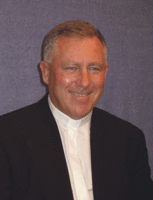Archbishop John Dew
Opinion
Archbishop John Dew
At the beginning of December last year I was privileged to attend a meeting of the Santa Marta Group in London. The Santa Marta Group was set up by Pope Francis in April 2014 to form an alliance of police chiefs and bishops from around the world who would come together with civil society to try to counter and overcome the evils of human trafficking. Pope Francis said in his Apostolic Exhortation, Evangelii Gaudium, ‘This issue involves everyone. This infamous network of crime is now well established in our cities and many people have blood on their hands as a result of their comfortable and silent complicity’ [EG 212].
Human trafficking – modern-day slavery – is happening in and around New Zealand. While we think human slavery was abolished long ago, there are actually more people in slavery today than at any other time in human history. Think about these facts:
- every 30 seconds someone is trafficked
- the average age of victims is 13 years
- females make up 75 per cent of all victims
- only one to two per cent of victims are ever rescued
- traffickers and sex buyers are equally complicit
- sex trafficking generates 99 billion US dollars every year
- human trafficking is a problem and it does affect New Zealand.
The global slavery index of 2014 estimated there are 35.8 million people enslaved around the world, and New Zealand has about 600 of them. It is an issue for all of us. The Santa Marta Group is working to help people to know churches are able to make an enormous contribution to overcoming this great scandal.
People who are caught up in some kind of slavery such as domestic work, the sex industry, agriculture, horticulture and viticulture are not in isolation. They belong to families and to communities. It is only when members of families or the local church, mosque or temple speak up that such people can be supported and set free.
At the Santa Marta conference in London last December I had the opportunity to hear the issues and observe the horrific stories of some witnesses. My eyes were opened to this terrible human tragedy.
Now that I have been nominated by Pope Francis to be a Cardinal, I know there will be other opportunities to become aware of problems, challenges and difficulties that face the Church and society today. Human trafficking is clearly one of them.
Pope Francis said in his official letter of 4 January 2015 to the new Cardinals, ‘through this appointment the Lord is once again calling you to serve through the Church’. He went on to say that we are to serve with humility, to maintain humility and banish all notions that the cardinalate is seen as a reward, the crowning of a career, a position of power or a badge of honour. He reminded us we all need to constantly pray for humility [see letter on this page]. Therefore, I ask for your prayers. I know I already have those prayers and I thank you very much for them, and for the many messages of congratulations and good wishes I have received.
Nearly all the messages spoke about prayerful support for me in this role as Cardinal. I would be most grateful if you would continue that prayerful support, and I thank you sincerely.